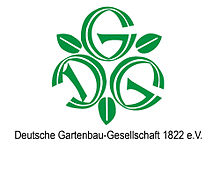German Horticultural Society 1822
The German Horticultural Society 1822 eV (DGG) is the oldest German horticultural association. As the umbrella organization of green clubs, associations, associations and interest groups in Germany, the DGG wants to strengthen the importance of “gardening for the sake of people and nature” in relation to society and politics through the cooperation of as many like-minded people as possible.
history
The German Horticultural Society was founded in Berlin in 1822 as an association for the promotion of horticulture in the Royal Prussian States and was the first horticultural association in Germany.
The aim was to improve and disseminate horticulture and garden culture for gardeners and the bourgeoisie through specialist information and advice, publications, lectures and exhibitions. In addition to a number of high-ranking art, court and commercial gardeners as well as personalities from all walks of life, well-known scientists gave the association and its activities significant impulses - for example Alexander and Wilhelm von Humboldt , gymnastics father Jahn , agriculture expert Albrecht Daniel Thaer , the poet Ernst Moritz Arndt , the industrialists Werner von Siemens and August Borsig and, above all, Peter Joseph Lenné as an active board member.
In 1823 Lenné presented his plans for a technical school to train gardeners to the association, because he saw the technical instructions as an opportunity to combine interest in the useful with a sense of the beautiful. In the same year the gardener training institute was founded in Neu-Schöneberg, which later became the technical college in Berlin-Dahlem.
As a pioneer of garden shows, the association achieved the full development of its capacity through regular plant exhibitions at a high level of information, including the Great General Horticultural Exhibition in 1890 and the International Horticultural Exhibition in Berlin in 1909.
In 1910 the association was named German Horticultural Society . The war years paralyzed activities almost completely. Only with the re-establishment in 1955 under the presidency of Lennart Bernadotte began a new era. He put the DGG under the motto “Gardening for the sake of man”, proclaimed the Green Charter of Mainau in 1961 and initiated the national competition Our village should become more beautiful in the same year .
In 1982, his wife, Sonja Bernadotte , was elected president and remained so for 26 years until shortly before her death in autumn 2008. Under the guiding principle of "gardening for people and for nature", Countess Sonja promoted gardening culture with forward-looking ideas Projects such as the Paths to Nature Education , competitions and awards for excellence.
Since 1990 the association has been called " German Horticultural Society 1822 eV ".
tasks and goals
Designing the garden and landscape as meeting point for man and nature in a contemporary way and keeping it alive in an ecological balance is what the German Horticultural Society calls its primary task. The DGG understands the promotion of garden culture to mean the preservation, development and care of the natural and social environment. It includes house and garden, town and village as well as the landscape. The DGG is committed to this with various programs and projects:
- Library of the German Horticultural Association
- Federal Working Group on Plant Collections (BAPS)
- Garden culture path
- Garden network Germany
- Network of plant collections
- Publications
- Paths to nature education
- Competitions
- "Garden & Medicine": On February 22, 2018, the Advisory Board "Garden and Medicine" was founded with the aim of making recommendations on the subject of "Greenery and Health".
structure
The DGG Presidium has 20 members. In addition, there is an advisory board in which numerous horticultural, horticultural and rural maintenance organizations and authorities are represented. The advisory board serves as a platform for a comprehensive, mutual exchange of information and opinions. Karl Zwermann, previously President of the Central Horticultural Association (ZVG) for 15 years , was elected to succeed Countess Sonja Bernadotte in October 2008. With his presidency, a new era began for the DGG, which returned to its origins at the beginning of 2009, in Berlin. In the federal capital, the DGG wants to exert its influence on politics for garden culture and horticulture. Klaus Neumann has headed the DGG as President since 2016.
Web links
- Website of the German Horticultural Society 1822 eV
- Website of the network plant collections project
- Krieg, Silke: The history of the German Horticultural Society 1822 eV through the ages (1822–1992), a brochure with materials on the history of the 170th anniversary of the DGG on September 11, 1992
Individual evidence
- ^ New advisory board “Garden & Medicine” of the DGG. neuelandschaft.de, March 26, 2018, accessed on July 1, 2020 .
- ↑ List of associations and representatives. bundestag.de, June 26, 2020, accessed on July 1, 2020 .
